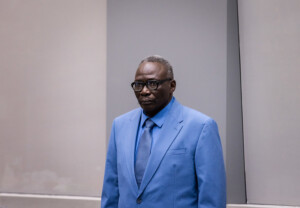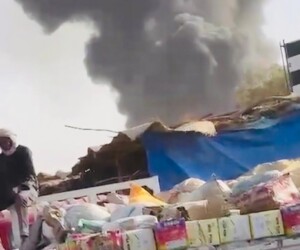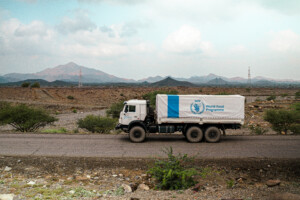ACJPS documents human rights abuses in West Darfur, often by RSF
African Centre for Justice and Peace Studies (ACJPS) expressed its deep concerns over the continued violation of human rights by law enforcers in Sudan, especially in West Darfur. The organisation highlights various examples of killings, detentions, illegitimate use of the Emergency Law, and other rights abuses, often involving the Rapid Support Forces (RSF).
 Prisoners and guard in Sudan (file photo)
Prisoners and guard in Sudan (file photo)
African Centre for Justice and Peace Studies (ACJPS) expressed its deep concerns over the continued violation of human rights by law enforcers in Sudan, especially in West Darfur. The organisation highlights various examples of killings, detentions, illegitimate use of the Emergency Law, and other rights abuses, often involving the Rapid Support Forces (RSF).
The detentions and violations especially targeted displaced people and tribal leaders who oppose the RSF in Darfur.
In a statement last Friday, the ACJPS stated that it has documented an incident where 177 people were detained under the Emergency law after a tribal conflict in July, despite the lifting of the state of emergency in May.
Not much later, a tribal leader was arrested and charged in a mass detention campaign.
In another incident, 21 youth from Kereinik camps for the displaced were detained and transferred from West Darfur to El Huda prison in Omdurman where they are being held without charges since April, the organisation explains.
The ACJPS also documented an incident of an armed attack that resulted in 18 deaths in Bir Saliba in West Darfur with an unclear level of RSF involvement.
Detention of those opposed to RSF reconciliation
On August 1, Iringa tribe prince Azhari Ahmed Sanousi (55), was held and charged with five offences after he made statements distancing himself from tribal reconciliation attempts that took place under the auspices of Gen Mohamed ‘Hemeti’ Dagalo in El Geneina, West Darfur.
These agreements brokered in Darfur by Hemeti, who is a coup leader, Deputy-Chairman of the Sovereignty Council, and Commander-in-Chief of the infamous RSF, have been criticised as being ‘superficial’ and as not representing the interests of the people.
The head of Hemeti’s West Darfur Peace and Tribal Reconciliation Committee, RSF Col Mousa Hamid Ambeilo, is also held responsible for “committing grave crimes in the region, including crimes against humanity” by lawyers in Darfur.
Sanousi was taken to El Geneina prison where he was charged with several offences including waging war against the state and disturbance of public peace. He was released on bail after spending three nights in detention. Reliable sources informed ACJPS that the order to detain El Sanousi came from RSF commanders.
At the time of the tribal leader’s arrest, the Darfur Bar Association and partners reported the detention of at least 197 people by the RSF in West Darfur in a campaign that targeted tribal leaders who refuse to partake in RSF-led reconciliation efforts and other activists, teachers, students, and farmers. Several people disappeared.
Hemeti and his RSF in Darfur
The position of the RSF in Darfur is highly contentious. The RSF was established by the Al Bashir regime in August 2013 and grew out of the janjaweed militias which fought for the Sudanese government in Darfur since the war broke out in 2003 and were largely made up of Arab herding tribes. The Janjaweed are held responsible for the genocide against Darfuri farmers and other non-Arab/African groups.
The RSF is widely believed to be responsible for atrocities in the Kordofan and Darfur regions in the past years and is also widely condemned for their role in the October 25 military coup and subsequent violence against pro-democracy protesters.
Mass arrest of tribesmen
On 25 July, joint forces comprised of the paramilitary Central Reserve Police (Abu Teira), the Sudanese Alliance Forces (a signatory to the 2020 Juba Peace Agreement under the command of Gen Khamees Abakar) on the instructions of the governor of West Darfur, and the RSF Darfur division led by Ambeilo detained 177 people of the Tama tribe and Aura clan and some other clans living in the area.
The Aura clan previously belonged to the Tama tribe but later broke away because of land conflicts. Earlier that day, two Tama tribesmen shot dead a man from the Aura clan in Kereinik. A group of Aura youth launched a counterattack against the Tama which resulted in the killing of six Tama tribesmen.
Relying on the Emergency Law in the state, joint forces were deployed in the area and thus detained 177 people. 65 of the detainees belong to Tamazuj, a signatory of the Juba Peace Agreement.
90 detainees were transferred to Port Sudan prison in Red Sea state and 87 others were detained in El Geneina Prison. The detainees are likely to be subjected to six months of imprisonment under the Emergency and Public Safety Bylaw of 1998.
The detention of 21 displaced youth without charges
On April 15, 21 youths were transferred by West Darfur authorities to El Huda Prison in Omdurman. The detainees are from Kereinik camp for the displaced. In January, camp leaders had reported them to the police in the camp claiming that they were disturbing the peace in the camp.
They were accused of selling and abusing drugs such as Tramadol tablets which have become very common in El Geneina since they have access to drugs from Nigeria smuggled through the Chadian border.
The group was detained without charges. The Sudanese acting Senior Public Prosecutor Khalifa Ahmed Khalifa refuses to release them and he referred the case to the Sovereignty Council to decide.
The Darfur Bar Association and its partners accused the governor of West Darfur of practicing enforced disappearance of detainees in West Darfur by holding them for months without charges.
They also condemn the conditions in which the detainees are held. They reported that the 21 detainees are being held in an isolated section of El Huda Prison in Omdurman since April with a serious lack of water, the spread of mosquitoes, harmful insects, and poor food.
The lawyers also explained that there are minors and one teacher amongst the detainees.
The killing of 18 people in Bir Saliba
On August 4, 18 people from Arab Rizeigat clan were killed in an attack in Bir Saliba by a Chadian armed group.
The Chadian armed group had moved following tracks of unknown attackers who had stolen camels from their territory and had already killed two herdsmen and injured another in the area the day before.
On August 7, reliable sources confirmed to ACJPS that several RSF forces went to Chadian territories to investigate the incident without orders from their commander.
ACJPS was informed by a reliable source that one of the Chadian opposition leaders was seen with RSF forces deployed in Jebel Moon, West Darfur, in July.











 and then
and then